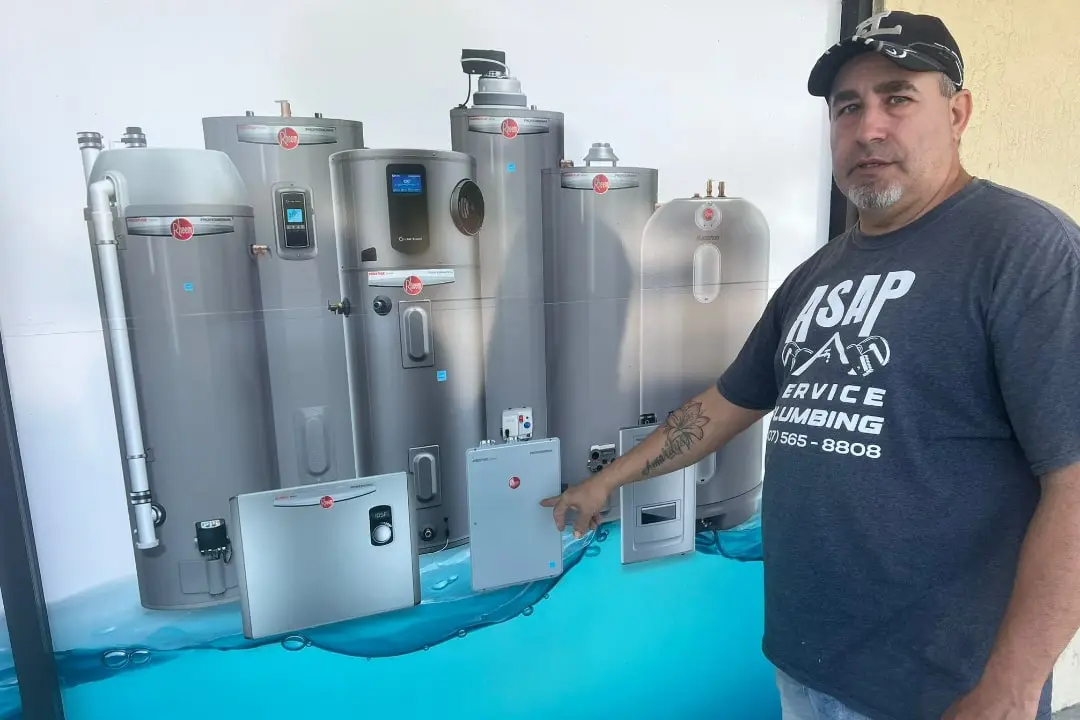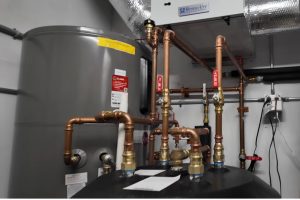Replacing a water heater is a common home improvement task. Before you jump into it, it’s crucial to understand water heater replacement costs. This helps you budget effectively and avoids any unpleasant surprises down the road.
With a clear understanding of the price range, you can make informed decisions and ensure a smooth water heater replacement process.
In the US, the national average water heater replacement cost typically would be $1,293. However, in areas like Orlando and Kissimmee, things can be a bit pricier. These regions often have slightly higher replacement costs compared to the national average.
So, let’s explore what factors can affect the final price tag and get you a more accurate estimate for your situation.
How much does Water Heater Replacement Cost in Orlando and Kissimmee?
The exact cost can vary depending on the location. In Orlando and Kissimmee specifically, it tends to be a bit higher. For instance, you might expect to pay between $1,100 to $2,300 for a water heater replacement.
Factors such as local demand, availability of skilled labor, and cost of materials contribute to these varying price ranges. Therefore, homeowners in these regions should obtain multiple quotes and assess their specific needs before proceeding with a replacement.
Water Heater Replacement Cost by Type
When you’re thinking about replacing your water heater, the cost can vary based on the type you choose. You’ve got options like standard tank-style and tankless heaters. But you will have many more choices under these two categories.
Take your time to explore these choices so you can pick the right water heater that fits both your needs and your budget.
| Type | Cost Range |
| Electric | $500 – $1,500 |
| Gas | $800 – $2,000 |
| Propane | $1,000 – $2,500 |
| High Efficiency | $900 – $2,500 |
| Indirect | $1,200 – $3,000 |
| Solar | $2,000 – $5,000 |
| Hybrid Heat Pump | $1,000 – $3,000 |
| Tank | $500 – $1,500 |
| Tankless | $1,000 – $3,500 |
What Are The Water Heater Replacement Cost Factors?
Replacing a water heater involves several cost factors to consider. These factors can significantly influence the overall expense of the replacement process. Understanding these factors is crucial for homeowners to budget effectively and make informed decisions about their water heater replacements.
1. Labor Cost Per Hour
In the case of replacing your water heater, the labor cost per hour matters a lot in figuring out your total expenses. Plumbers usually charge different hourly rates, which can range from $60 to $120 per hour.
Going for a higher rate might mean getting a more experienced plumber, leading to a smoother installation. But if you go for a lower rate, it could result in longer installation times or potential issues, impacting your overall cost.
2. Parts and Materials
While considering water heater replacement service, don’t miss to check out the cost of parts and materials.
This includes the actual water heater unit itself, along with any additional components needed for installation, such as pipes, fittings, and insulation. The price of these items can vary depending on factors like the type and size of the water heater you choose, as well as any special requirements for your home’s plumbing system.
Here’s an approximate breakdown of the prices for common materials needed for water heater replacement:
| Material | Approximate Price Range |
| Water Heater Unit | $500 – $1500 |
| Pipes and Fittings | $50 – $200 |
| Insulation | $20 – $100 |
| Venting System (if needed) | $100 – $300 |
3. Unit Size
The size of the water heater you choose can impact both the upfront cost and the long-term efficiency of your system.
Typically, water heaters come in various sizes, ranging from 30 to 80 gallons, you have flexibility but also need to balance capacity with budget.
Prices can vary based on factors like brand and efficiency ratings. To ensure you get the right size at the best price, consulting with a professional plumber is key.
Here’s an overview of the average prices for water heaters of different sizes: [source]
| Unit Size (Gallons) | Average Price Range |
| 30 | $550 – $1,700 |
| 40 | $550 – $2,000 |
| 50 | $700 – $2,200 |
| 75 | $1,200 – $3,400 |
| 80 | $1,300 – $3,600 |
4. Fuel type
When replacing your water heater, another crucial factor to consider is the type of fuel it will use. This decision not only affects your upfront costs but also influences your long-term expenses.
In cities like Orlando and Kissimmee, you have several fuel options to choose from, including electricity, natural gas, propane, and solar power. Each fuel type comes with its own advantages and disadvantages, impacting both the initial investment and ongoing operational costs.
Generally, solar, electric, and other highly efficient units come with higher upfront costs due to their advanced technology and installation requirements. In contrast, gas units often have lower initial expenses.
5. Venting System
The venting system is another factor to consider when replacing your water heater. There are two main types of venting systems: direct and power.
Direct-vent heaters are more budget-friendly, utilizing an exhaust pipe or chimney to expel gases. On the other hand, power-vent heaters come at a higher cost, employing a fan or blower, along with electricity, for ventilation.
Typically, you can expect to spend an additional $300 to $600 for a power-vent unit.
Additional Costs and Considerations
When budgeting for your water heater replacement, here are some key considerations to keep in mind:
1. Installation Fees:
Alongside the water heater’s price, remember to consider professional installation costs. When you hire a licensed plumber, they ensure proper setup, though it might mean added charges for their services. Considering professional installation guarantees the job is done right that will reduce the likelihood of future problems.
2. Permits and Regulations:
Before you start the installation process, check your local regulations regarding water heater setups. Depending on where you live, you might need permits, which can add to your expenses. Include these permit fees in your budgeting to avoid any unexpected financial setbacks.
3. Energy Efficiency:
While more energy-efficient models may have higher initial costs, they offer long-term savings on your energy bills. Compare the energy efficiency ratings of different water heaters to find the best value for your home. Choosing a model with higher efficiency can lead to significant savings on your monthly utility bills over time.
4. Warranty Coverage:
Some water heaters come with warranties that cover both parts and labor for a specified period. Prioritize units with comprehensive warranty coverage to give yourself peace of mind and potentially save money on future repairs. Choosing a water heater with a strong warranty protects you from unexpected problems, saving you money on repairs.
Can You Save On Water Heater Replacement?
Yes, you can definitely save on water heater replacement! Here are some ways to stretch your budget:
1. Consider Repair vs. Replace:
Assess your water heater’s condition and the nature of the issue. If it’s relatively new and the problem seems minor, like a faulty thermostat or a small leak, repairing it could be cheaper than replacing it entirely.
But if it’s old or facing significant issues like a corroded tank, investing in a new one might save you money in the long run.
2. Shop Around for the Heater:
Take your time to compare prices for different water heater models and brands. Check online and local retailers for sales or promotions.
Look into features like energy efficiency ratings and warranty coverage to ensure you’re getting the most value for your money. Remember to factor in additional costs like delivery fees or installation accessories.
3. Get Multiple Quotes for Installation:
Don’t settle for the first plumber you find. Reach out to several licensed plumbers in your area to get quotes for the installation job.
Provide them with the same details about your current setup and the type of water heater you’re planning to buy to ensure accurate pricing comparisons. Consider factors like their reputation, experience, and warranty offerings along with the quote.
4. DIY (If Comfortable):
If you have plumbing skills and feel confident, you might save on installation costs by doing it yourself. But make sure you’re comfortable with the task, consider safety concerns, and check local building codes. If DIY isn’t your thing, hiring a professional plumber ensures the job gets done right.
Conclusion
When you’re considering water heater replacement in Orlando or Kissimmee, it’s important to think about all the costs involved. This includes not only the price of the new water heater itself but also the fees for installation, any necessary permits, and how energy-efficient the new unit is.
Even though it might cost more at first, think about how much you could save over time on your energy bills, especially if you choose a more efficient model.
Take your time to shop around and compare prices from different retailers and plumbing services. Look out for any discounts, promotions, or financing options that could help make the purchase more manageable for your budget.
By planning ahead and doing your research, you can find a solution that meets your needs without breaking the bank, keeping your home comfortable and your wallet happy.
FAQs
What’s the most cost-effective type of water heater?
For many homeowners, a tankless water heater proves to be the most cost-effective option. While it may have a higher upfront cost, its energy efficiency leads to long-term savings on utility bills. Additionally, tankless heaters typically have a longer lifespan, reducing maintenance and replacement costs over time.
Should I get an electric or gas water heater?
When deciding between an electric or gas water heater, consider factors like your home’s setup and energy options. Gas heaters may offer faster heating and lower costs, but require proper ventilation. Electric heaters are simpler to install and may suit smaller spaces better. Evaluate your needs to make the best choice.
How long does it take to install a new water heater?
The time to install a new water heater varies depending on factors like the type of heater, any necessary modifications, and the expertise of the installer. On average, installation can take anywhere from 2 to 4 hours for a straightforward replacement, but more complex installations may take longer.




